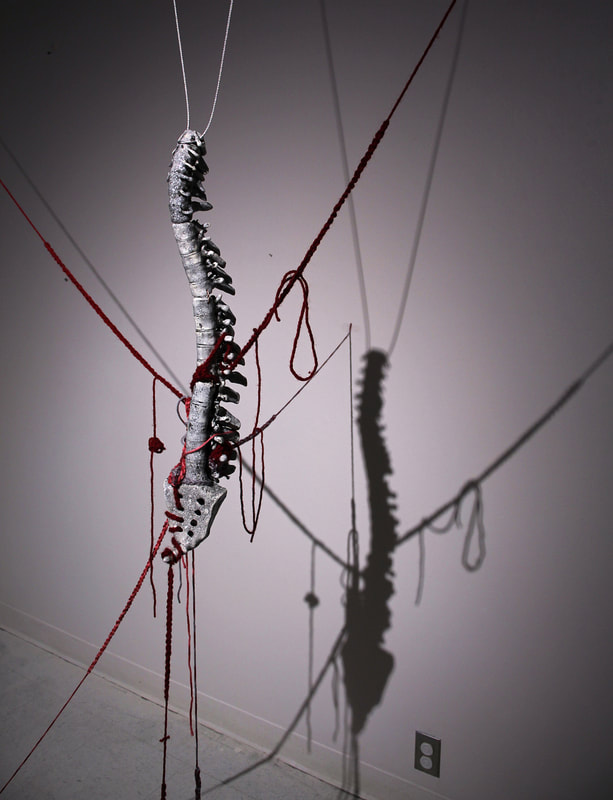Uncommonly Honest
Common Experience Panel Sheds Light on Disability Visibility
Artwork showcased at the event by Riegger. They describe this piece as “This installation is a body narrative piece of a burdened back with knots, tightness, and a history of labor-intensive activity.”
October 31, 2022
Growing up in Michigan, Carly Riegger battled constant pain in their weak muscles and aching joints.
“I was trying to be as able-bodied as possible and it was killing me,” Riegger said, recounting the many years of trying to mimic others at school and in the neighborhood.
Their comments came during the kickoff for “Common Experience” — an annual series of IUS discussions and events for students and employees organized around a theme. The second event is Wednesday, when comedian Ryan Niemiller, who has disabilities in both arms, will perform midday at IUS. Niemiller has nicknamed himself “The Cripple Threat of Comedy.”
This academic year, the “Common Experience” book is Alice Wong’s Disability Visibility: First Person Stories from the Twenty-First Century.
An October “Common Experience” event included Riegger, a ceramic artist in post-baccalaureate studies in that discipline at IUS.
Students attending the panel discussion emphasized the significance of such a discussion. Digital Art major Jazz Strope, who describes himself as neurodivergent, noted how “hearing a panel of individuals who spoke about their experiences was very impactful” on him.
Riegger’s insights into the often-unseen nature of disabilities also made a deep impression on physics major Mackenzie Kaskie.
“Someone with a disability can be anywhere around you,” she said. “It may not be visible. I think we should be open when we think about those with disabilities and understand that not all of them fit into this social stigma. Even though someone may look fine, they may have more going on. Chronic pain, social anxiety, struggling with attention.”
Riegger echoed this by describing how their work in ceramics brings visibility to their otherwise unseen chronic aching caused by Ehlers Danlos Syndrome. It’s a genetic disorder that shoots pain in connective tissue throughout one’s body.
“I make a lot of my artwork about my disability…so having them [my disabilities] be invisible, ceramics is a way to bring it out so that people can see it.”
Riegger was one of three October panelists who are current and former students discussing disabilities seen and unseen. The panel included current student Cheri Receveur, as well as alumnus Jose Aponte. Matt Springer, coordinator of disability services at IUS, moderated the poignant, two-hour talk. As one of them shared thoughts and anecdotes aloud, it seemed to move another to remember something else and do the same.
Aponte, who earned his master’s in mental health counseling in August, has battled post-traumatic stress disorder (PTSD) and depression. Aponte served 24 years in the U.S. military with tours of duty in Afghanistan, Iraq and elsewhere before retiring.
“The one thing I’d like people to realize is you don’t see it,” he said at the October “Common Experience” discussion, referring to mental health deterioration. “But there are some days when you just want to cry and stay there.
“People tend to see me as successful based on all I’ve done,” Aponte said. “But that doesn’t mean there weren’t dark times. Those dark times led me to where I am today. And I’m grateful for those dark times because they changed me for the better.
“Now I can help others with my story,” he said.
Much of the event highlighted and explored misperceptions regarding disabilities, such as the myths and how people without disabilities interact with people who have them. Panelist Cheri Receveur emphasized how tough it is to truly understand the diversity of disability. For example, attention-deficit/hyperactivity disorder (ADHD), which Receveur has, can vary greatly from one person to another.
Student feedback has only pointed to the success of this “Common Experience” panel. Students such as biology major Reagan Kelley hope for more opportunities to continue this dialogue.
“I was worried I wouldn’t find a place,” Kelley said, “because I have to admit that I did think about those who might have a harder time than me. However, I realized that we all are a community surrounded by this. Some of the speakers had the same issues that I live with as well. I didn’t feel out of place at all. If anything, I was relieved to go to this event.”
Strope, the neurodivergent student, explained his takeaway from this event by saying, “The most important step in the future of disability advocacy is highlighting the voices and experiences of disabled individuals, as well as fighting for our seat at the table to be involved in decisions.”


